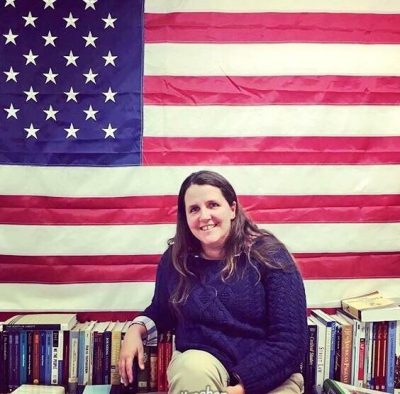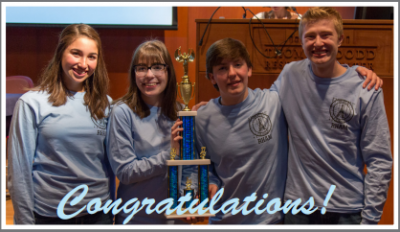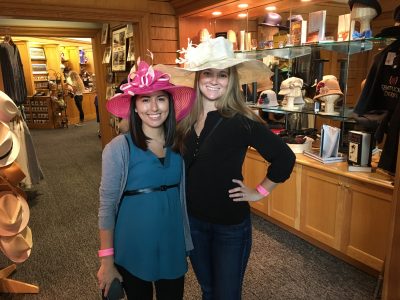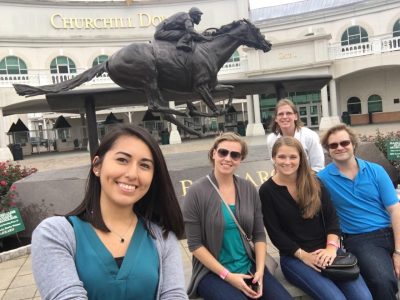By Erin Donohue, Pre-College Summer Graduate Assistant
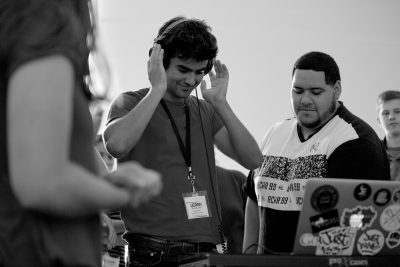
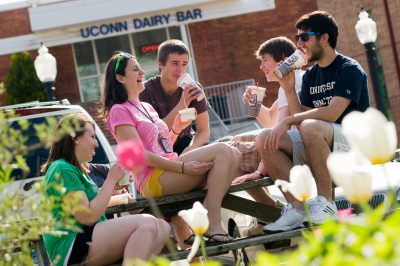
By Erin Donohue, Pre-College Summer Graduate Assistant


The 2017-2018 academic year was off to a strong start. On September 27, 2017, the ECE Marine Sciences, Maritime Studies, Physics and Engineering students participated in the 7th annual UConn Avery Point Cardboard Boat Race. The event is always a fun and exciting time filled with lots of laughs. This year we had about 450 students and instructors in attendance.
Participating in this year’s event were twenty one partner high schools:Waterford High School, Marine Science Magnet High School, Science and Technology Magnet High School of Southeastern Connecticut, Manchester High School, University High School, Westbrook High School, Norwich Free Academy, Shelton High School, Windham Tech, Lyman Hall High School, H.C. Wilcox Tech, Kaynor Tech, Glastonbury High School, Ellington High School, Bridgeport Aquaculture, Enfield High School, Hartford Engineering and Green Tech, Emmett O’Brien Tech, Ledyard High school, Northwestern Regional High School and Daniel Hand High School. The team from H.C. Wilcox Technical High School won first place in the UConn ECE Championship Division.
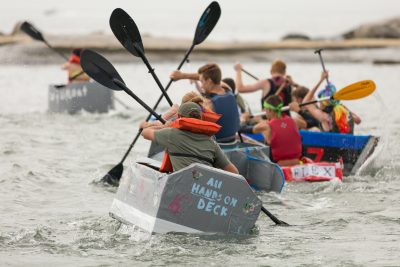
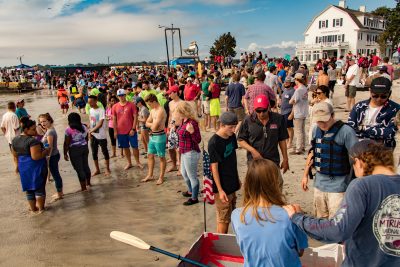
Description: Students at Enfield High School demonstrated a strong interest in dissections while in their biology courses. As an extension of this topic, Professor Lenn and Professor Finn-Scofield would like to organize a dissection club to expand the number of species the students dissect and continue their engagement in the subject. They will receive funding for different types of species along with equipment needed for dissection.
Description: Franklin Academy serves students on the autism spectrum and with non-verbal learning disabilities. Individuals carrying these diagnoses tend to have slower processing speeds, difficulty with planning and organization, and frequently struggle to interpret information presented visually. Much of the analytical reasoning taught in MATH 1030Q is based on analyzing presented data. In order to provide students with an easier way to read and follow data associated calculations in class, Professor Bigelow requested to purchase an LCD projector and document camera to aid instruction and visual transfer of large data sets, graphs, and tables.
Description: In collaboration with the Crosby Fund for Haitian education, students will create French language science activities for students in Haiti. Students will better understand the Haitian culture, use the French language in authentic ways, and provide Haitian students with needed learning resources. Professor Faga has requested funding to cover the cost of materials for educational activities and her initial travel to Haiti to personally deliver materials and provide professional development. With the approval of the Board of Education, Professor Faga plans to take students to Haiti during the 2018-2019 academic year to allow them the opportunity to implement >the educational activities they create.
Description: As they study the history and evolution of the American Experience, Professor Maher and Professor Mariano believe it is important for students to be engaged with the diversity of the nation. To do this in meaningful ways, they would like to expose their students to individuals different from themselves and challenge students to discuss the issues our country has faced and their implications to today’s world. This grant will fund student transportation to work in collaboration with ECE professors and students at Kennedy High School. The project will expand students diversity and create an authentic learning experience outside of their usual classroom.
Description: Ridgefield High School is working on a project called “Barcode Ridgefield.” Barcode Ridgefield will teach students about biodiversity in their local area through the process of DNA barcoding. Students will be trained on how to DNA barcode, collect field specimen, develop relationships with park managers, and develop a database platform to share information to the public. The funding they receive will go directly to the materials needed for students to perform DNA barcoding. This project will enhance the NRE 1000 students understanding of biodiversity, which is one of the essential understandings of the course.
Description: Professor McKenna willreceive funding to support a new reading initiative in ECE ENGL 1010 & 1011. She has redesigned her course syllabi to support student choice in the course reading selection in order to encourage more authentic lifelong reading and writing experiences. The money received will go directly to the purchase of various books to back the choice of text selection for her students.
Description: Rocky Hill High School students in HDFS 1070 will travel to Heifer International in Rutland, MA, which is an organization working to end world hunger and poverty. Students will experience the Global Village representing countries around the world, and will partake in a service project. Once the students return to school, they will create projects showcasing what they have learned and developed. The money received will go directly to the field study materials, transportation, post-activity materials, and the purchase of a goat for a Heifer family.
Description: To enhance the accuracy of measurements taken in physics labs, Professor Marrash will receive funding to purchase PASCO Computer Data Collec tion 550 Interfaces. The new technology will improve students’ laboratory skills and expose them to real-world physics lab techniques. Students will be confident about their data collection and more engaged with topics they are studying.
Description: University High School is in need of equipment and supplies to run the ECE Chemistry course. Materials needed include burets, separatory funnels, non-graphing calculators, and paper towels. The money will go directly to the purchase of these supplies.
Description: Professor O’Lynnger will take her students to the Newport Mansions where they will look at the opulence seen in The Great Gatsby and then volunteer at a local organization to demonstrate the experiences of people with different economic status. These visits will correspond to literature about the American Dream. Students will reflect on these experiences with journal entries and ultimately with a book of pictures and essays. The final product will be sold and proceeds will go to the local organization with which they work.
Description: Wilcox High School is starting a project based on the summer reading of The Martian where student groups will have to problem solve using different techniques from their biology and physics courses. Professor Papa and Professor Czerwinski have requested equipment that will help students solve the problems one would encounter if trapped on Mars. Once the project is completed, the results will be showcased in a “Martian Day” that will be open to students and the com munity. They will continue to use the equipment purchased for their biology and physics problems after this project is complete.
Description: In an effort to be more< conservation minded and environmental friendly, students in the Environmental Science course will place recycling bins in all classrooms and offices then work with the entire student body to increase recycling efforts at the school. Teams of students will collect and weigh the contents for students in STAT 1100Q to analyze and determine the success of this program.
By Brian Boecherer
As I write this article for our newsletter, the week of Thanksgiving, I am recalling the arguments of the book again in response to an editorial in the Chronicle of Higher Education
Dr. Gilbert is imbedding many assumptions about the nature of inequality into his editorial, but the point I believe he is trying to make is that a heterogeneous group of students makes for more diverse classroom discussions. This is certainly true; however, his argument, which is anecdotal, only holds together if we limit the arena to select general education courses at a university. His observations that concurrent enrollment is contributing to inequality does not consider the arena of the high school nor does it consider the issue of being admitted to a university. It does not consider that when a university invests in a quality connection with high school faculty, staff, and students, the entire educational enterprise benefits. The more we develop the partnerships, the more diverse populations that can benefit from this option.
It is important to start the conversation with framing the original intention of our program, that is, to make the senior year in high school more interesting, engaging, and beneficial for both students and instructors. UConn is the oldest concurrent enrollment program in the country, so the national conversation starts here in Connecticut. In 1954 Provost Waugh suggested that if we can work with the best and most credentialed high school instructors in the State, we can create an educational system that transforms all levels of high school education so that lower level classes prepare students for UConn courses – whether they be taught at the high school or at UConn itself. Provost Waugh also wanted to combat the problem of seniorities, something he attributed to boredom in the classroom. When you look at education as being a lifetime pursuit and on a continuum, the ability to offer college courses while in high school often rescues students and instructors by offering differentiated learning. Using the arguments of Dr. Sen, we are increasing the development in the high school, which results in increased student access, an awakening of one’s own academic interests, and the ability to invest in different University classes before going to college. As we seek to work with all high schools at an affordable rate and waive student fees for those in need, we are investing in the development of Connecticut.
There are many studies that suggest that when a student changes majors in college that their time to degree completion increases, which increases student debt, and delays entry into the job market or a more advanced degree. When students earn credits through UConn ECE, they are earning a currency which increases their competitiveness
What we do, collectively, is offer students freedom through development. Concurrent enrollment is the best system to provide this freedom at an affordable rate. I am suspicious of arguments, like Dr. Gilbert’s, which suggest that concurrent enrollment is contributing to inequality and that the only answer is to end these partnerships between high schools and universities. The pursuit of equality should not result in a lowering of the ceiling so no school and no student grows higher than another. We need to offer a diversity of opportunities, because we live in a world of diversity.
I hope you enjoy this year’s ECE newsletter magazine, it is filled with articles that highlight our engagement as a community and reminds us of why we commit to this task. Our best remedy to inequality is education and access.Concurrent enrollment is a model of development as
By Stefanie Malinoski
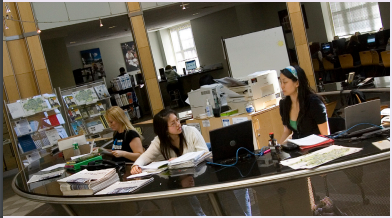
By Melanie Ochoa
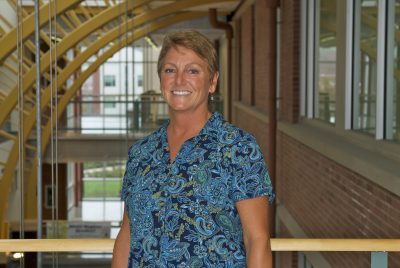
By Jack Greenwood Jr.
